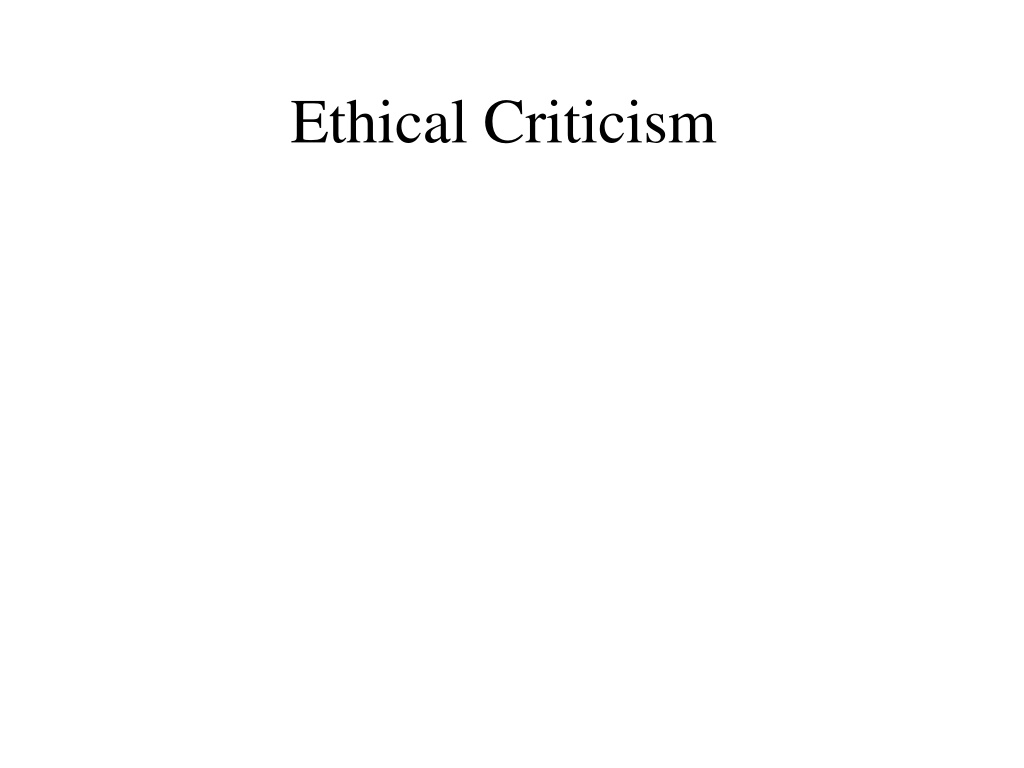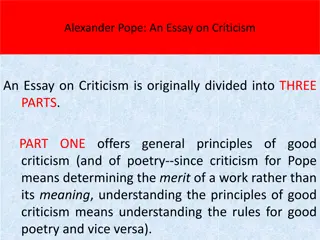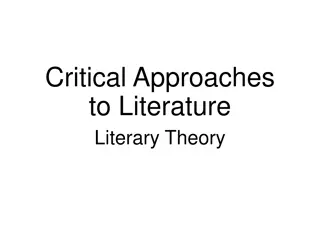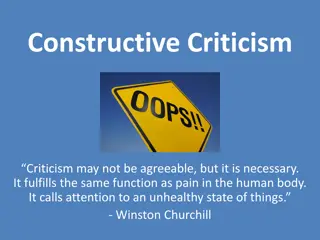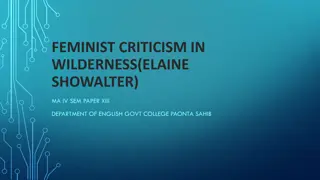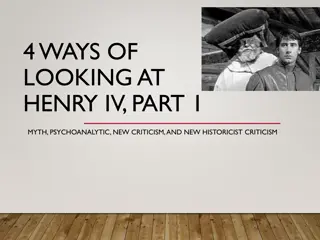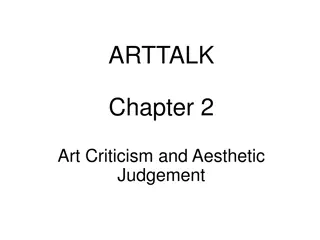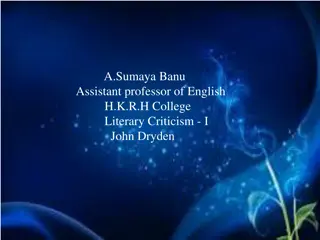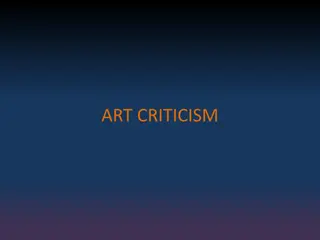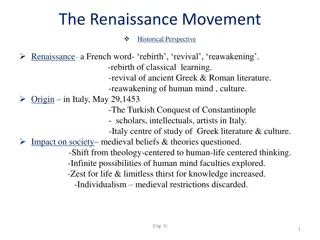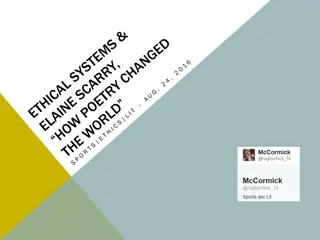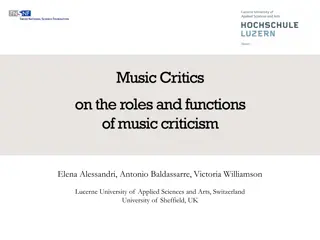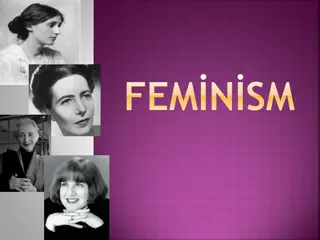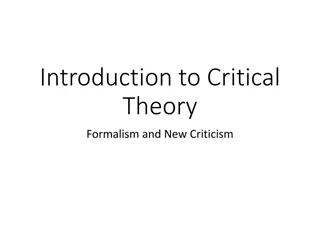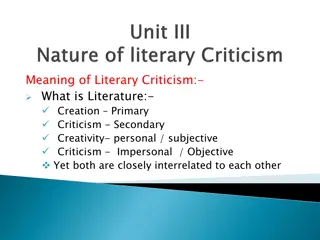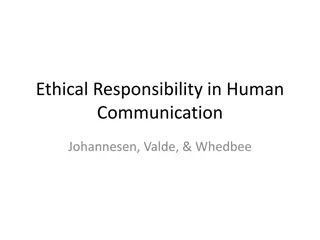Exploring Ethical Criticism and Literature's Human Possibilities
Ethical criticism in literary studies revolves around the intersection of ethics, literature, and criticism. It tackles concerns about the relationship between value judgments, ethics, and aesthetics, emphasizing the importance of reconnecting criticism with moral principles. Literature offers a deep exploration of human possibilities, fostering empathy and understanding through imaginative engagement with characters and their stories. Aristotelian insights shed light on the distinction between history and poetry, highlighting the profound impact of literature on our understanding of humanity.
Download Presentation

Please find below an Image/Link to download the presentation.
The content on the website is provided AS IS for your information and personal use only. It may not be sold, licensed, or shared on other websites without obtaining consent from the author. Download presentation by click this link. If you encounter any issues during the download, it is possible that the publisher has removed the file from their server.
E N D
Presentation Transcript
Questions, Concerns The term ethical criticism does not refer to a school or critical approach, but rather to an upsurge of interest in the relationship between ethics, literature, criticism, and theory since the late 1990s, often called the turn to ethics. There is a worry that criticism has shied away from value judgments, whether ethical or aesthetic and severed the millennia-long connection between criticism of literature and the arts and morality. Worries that in schools like post-colonial studies or feminism, politics has replaced ethics and that deconstruction is altogether nihilistic.
2 ways 1) a turn towards the ethics of narratives, esp. philosophers, like Alasdair MacIntyre, Paul Ricoeur, and Martha Nussbaum, but also by literary critics, like Wayne Booth >>> Aristotle. 2) a turn towards the ethical core of the then leading critical schools: one adopts the political agendas for ethical reasons; even deconstruction has an ethics, exemplified by Derrida s lifelong interest in L vinas and his claim that Deconstruction is Justice .
Literature and Human Possibilities [Literature] speaks about us, ... As Aristotle observed, it is deep and conducive to our inquiry about how to live because it does not simply ... record that this or that event happened; it searches for patterns of possibility that turn up in human lives with such a persistence that they must be regarded as our possibilities. (Nussbaum) Readers identify with the characters in fiction and in doing so enact their stories and it is this imaginative re-enactment which generates an understanding of other people s points of view, and often suffering, and of the moral demands placed on us. The text is an adventure of the reader , almost as if it were an educational or therapeutic role-playing exercise and it is this that makes us better and more responsive people. This sort of claim is one often made for classic realist texts (Eliot or Dickens). Part of the work of the novelist and especially the realist novelist is the education of sympathy. This idea too underlines much work in the medical humanities, where a sense that, for example, doctors who read widely in fiction may understand better the experience of being a sick patient, and so may become a better and more insightful doctor.
Aristotle The real difference [between history and poetry] is this, that one tells what happened and the other what might happen. For this reason poetry is something more scientific and serious than history, because poetry tends to give general truths while history gives particular facts. By a general truth I mean the sort of thing that a certain type of man will do or say either probably or necessarily. (Poetics 1451b). Tragedy is, then, a representation of an action that is heroic and complete and of a certain magnitude by means of language enriched with all kinds of ornament, each used separately in the different parts of the play: it represents men in action and does not use narrative, and through pity and fear it effects relief to these and similar emotions. (Poetics 1449b)
Emmanuel Levinas (1906-1995) A Lithuanian-born (his mother tongue was Russian) French philosopher and scholar of Judaism and the Talmud. Studied philosophy and sociology in Strasburg, then in Freiburg with Husserl, attends Heidegger s lectures. 1939. Naturalized French; enlists in the French officer corps. 1940. Captured by the Nazis; imprisoned in Fallingsbotel, a labour camp for officers. His Lithuanian family is murdered. His wife Ra ssa, and daughter, Simone, are hidden in Orl ans.
Ethics as first philosophy First philosophy is neither metaphysics or logic as traditionally understood and ethics is NOT rationalist self-legislation and freedom (deontology), the calculation of happiness (utilitarianism), or the cultivation of virtues (virtue ethics). It is an interpretive, phenomenological description of the rise and repetition of the face-to-face encounter, or the intersubjective relation at its precognitive core (experienced as sensibility and affectivity); viz., being called by another and responding to that other.
An encounter That encounter evinces a particular feature: the other impacts me unlike any worldly object or force. I can constitute the other person cognitively, on the basis of vision, as an alter ego. I can see that another human being is like me, acts like me, appears to be the master of her conscious life. The other person addresses me, calls to me. He does not even have to utter words in order for me to feel the summons implicit in his approach. Beyond any other philosophical concerns, the fundamental intuition of Levinas's philosophy is the non-reciprocal relation of responsibility.
Dialogue No event is as affectively disruptive for a consciousness holding sway in its world than the encounter with another person. In this encounter (even if it later becomes competitive or instrumental), the I first experiences itself as called and liable to account for itself. With the response comes the beginning of language as dialogue. The origin of language, for Levinas, is always response. Intersubjectivity is lived immediacy. Responsibility is the affective, immediate experience of transcendence and fraternity.
The Face The primacy of relation explains why it is that human beings are interested in the questions of ethics at all. To situate first philosophy in the face-to-face encounter is to choose to begin philosophy not with the world, not with God, but with what will be argued to be the prime condition for human communication. The encounter preceeds the subject-object divide. An I discovers its own particularity when it is singled out by the gaze of the other. This gaze is interrogative and imperative. It says do not kill me. It also implores the I , who eludes it only with difficulty, although this request may have actually no discursive content. This command and supplication occurs because human faces impact us as affective moments or, what Levinas calls interruptions .
Paul Ricoueur (19132005) Time and Narrative, 1984 88. Narrative identity: This has to do not just with the identity of the characters in a story or history, but with the larger claim that personal identity in every case can be considered in terms of a narrative identity: what story does a person tell about his or her life, or what story do others tell about it? This was a person capable of attesting to his or her own existence and acting in the world, a self that both acted and was acted upon who could recount and take responsibility for its actions. [Half-way between Cartesian assurance and post- modern flux.]
Ricoeurs little ethics Ethical intention [teleology]: aiming at a good life lived with and for others in just institutions . At the level of relations between a self and nearby or intimate others, the ideal of reciprocity entailed here is best expressed as solicitude that enables both self-esteem and self-respect on the parts of those involved. At the level of the distant other or others, the question of justice arises and with it new notions of respect and of institutions such as the rule of law. Beyond every institutionalized system of rules lies the transformative possibility of love which transcends the fragile and provisory practical mediations established by every ethical system through reinterpreting the golden rule. Love is a way of responding not just to the limits of any such system but to the tragic dimension Ricoeur sees as inherent in all human action, which never fully achieves what it intends, another reminder that human freedom is always a finite freedom.
Singularity Derek Attridge, The Singularity of Literature (2004), who argues that using literature for a particular purpose to further a political cause, or to illuminate, as evidence, a historical period is to pass over its distinctiveness, and, while part of what defines literature is its impossibility of definition, we can see three key interwoven characteristics of the literary, all of which both evoke the ethical. 1) Singularity: an artwork is a unique event just as for Levinas each encounter is not an example of meeting an example of a person, but a unique encounter with a unique face. 2) Alterity: an artwork, like another person, is profoundly other: there are no rules for it and to work to understand it is hard and demanding. 3) Inventiveness: the act of creation is both an openness to newness but also an awareness of what has gone before. The special ethical force of literature lies not in the world a work invents, but in the singular and inventive use of language in which that world is invented.
Ethics of Reading J. Hillis Miller The Ethics of Reading, 1987. Here, Miller, suggests that without storytelling there is no theory of ethics not because stories contain the thematic dramatization of ethical situations, judgments and choices but because an ethical rule (such as do not lie ) can be made to make sense only in particular situations which are themselves presented in and as narrative. This means that ethics is not just a form of language but a running or sequential mode of language, in short a story. . This leads Miller to conclude that, in making an ethical judgment, one is unable...to know whether ... I am subject to a linguistic necessity or to an ontological one .
Deconstruction and Trauma Again, influenced by deconstruction, the new interest in trauma is also one form of interest in ethics. Cathy Caruth s Unclaimed Experience (1996) argues that deconstruction s more subtle understanding of reference means it is suited to better approach the events and responses to atrocity and traumatic events which break the frame between event, language, and representation, and so express a concern with ethics more profoundly.
Trauma An exceptional form of memory; not a memory formed through symbols and narratives but one closer to the nature of an injury, a fact that is further supported by the Greek etymology of the term trauma, which means wound: a painful mark of the past that haunts and overwhelms the present. It is the analogical physicality of the traces left by the past in traumatic memory that complicates attempts to understand trauma in terms of cultural representation. Trauma became a key concept in clinical psychology, particularly in Freudian psychoanalysis, as it analogically described a psychological injury produced by the experience of an external event that damaged the individual's sense of self, and continued to produce belated negative effects that manifested themselves in the form of involuntary symptoms, for example, as disturbing nightmares and flashbacks. Trauma causes dissociation between the subject and its present, conscious experience, due to the pervasive, involuntary irruption of disturbing, incomprehensible memories.
Trauma and Memory Studies Growth in interest and popularity, particularly since the early 1990s. Trauma can be considered in this context as a pathological form of remembering. The official recognition of posttraumatic stress disorder (PTSD) by the American Psychiatric Association in the Diagnostic and Statistical Manual of 1980. This was connected in turn to the aftermath of the Vietnam War, as returning soldiers campaigned for recognition of their traumatic symptomatology. Cathy Caruth edited the volume Trauma: Explorations in Memory (1995), which is notable for a definition of trauma that makes it applicable across a wide range of events. Caruth provides an influential structural model of trauma, in which the very immediacy of the experience precludes its registration so that it exceeds the individual s capacity for understanding. The traumatic experience can only be registered belatedly and so is characterized by a temporal latency or delay.
Testimony Interest in trauma at Yale centred particularly on the Fortunoff Video Archive Project, led by psychoanalyst Dori Laub and literary critic Geoffrey Hartman, which recorded the video testimonies of Holocaust survivors. Testimony: Crises of Witnessing in Literature, Psychoanalysis and History (1992), co-authored by Laub and literary scholar Shoshana Felman. Intertwining of trauma studies and Holocaust studies. Historian Dominick LaCapra (2004) the study of trauma had become too encompassing. He made a case for distinguishing between what he termed historical trauma, which referred to specific natural or human-made historical catastrophes, and structural trauma, which encompassed such originary losses as entry into language or separation from the mother.
Memory Studies Reflecting a broader cultural interest an obsession some may say in memory as a phenomenon at once neuronal, psychological, cultural, and socio-political, the academic study of memory has seen scholars from diverse disciplines attempt to understand a subject that constantly challenges the traditional disciplinary boundaries on which academic research is based.
The Cultural Aspects of Memory British historian Frances Yates , The Art of Memory (1966), a study of early-modern memory practices that were, in turn, inherited from ancient Greek and Roman sources. Remembering was concerned not so much with reviving personal recollections but with the efficient storage and retrieval of information. Place system of remembering, in which a specific location, typically a building with many rooms, was internalized in the mind; the objects to be remembered were placed in the different rooms and were recalled by the individual mentally walking through the building. Literary scholar Mary Carruthers, The Book of Memory (1990) on the medieval period. The rise of the book at this time did not fundamentally transform memory practices inherited from the ancient world. Reading was thus regarded as an activity of memory and the medieval book was designed to facilitate memory. American literary scholar James Young published the highly influential The Texture of Memory (1993), which studied a range of Holocaust memorials across Germany, Israel, Poland, and the United States. Young concluded that the memorials, like the memory of the events they commemorated, were contingent on the time and place in which they were created. Every nation remembers the Holocaust according to its own traditions, ideals and experiences.
Communities and Places The Collective Memory (1950) by the French-Jewish sociologist Maurice Halbwachs. Memory is not an individual act but is framed by social structures of remembering. In contrast to history, which Halbwachs regards as universal, memory is more contingent and multiple, and requires the support of a group which is delimited in space and time. Memory groups: the family, the workplace, and religious communities, Pierre Nora s multivolume collaborative project on the national memory of France, Les Lieux de m moire (1984 92), looking specifically at the French nation as a collective and identifying the sites of memory that were particularly important in this context; these included places such as Versailles, the Louvre or the Eiffel Tower, but also events, for example Bastille Day or the Tour de France, and objects or symbols like the French flag and liberty, equality, fraternity. A pronounced nostalgic tendency. Sites of memory represent deliberate rather than spontaneous acts of commemoration and characterize the industrialized and secularized modern world. We inhabit a fallen and amnesiac modernity, which contrasts unfavorably with an idealized but lost peasant culture in which memorial activities occurred naturally.
